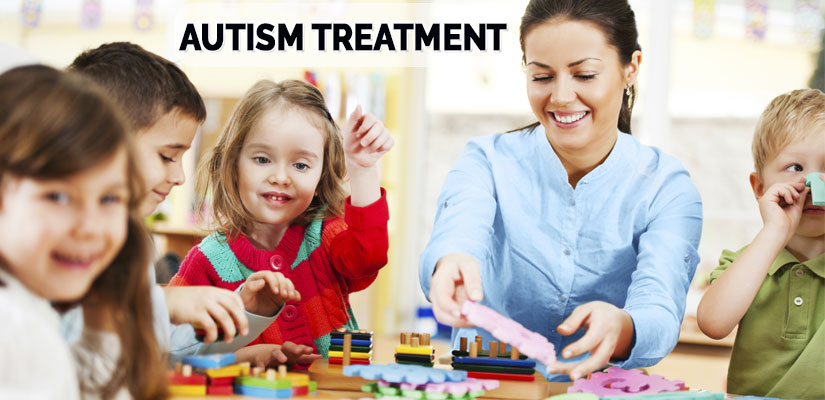
Autism is a neurodevelopmental disorder which affects the child at a very early age and the parents can notice its early signs and symptoms from 14-18 weeks after the birth of the child. Along with various diagnosis and screening option available you can check whether is your child has Autistic symptoms or not?
If you need any assistance or have a question about Autism Treatment, you can consult our HearingSol experts with your problem, feel free to call us on +91-9327901950. We are always here to help you.
After realizing its effect on your child what next thought come ups to your mind? obviously, the methods to treat your child but what’s the Autism treatment? Or do we have Autism Treatment? The only thing you could think of is the recovery of your child from this disorder.
But unfortunately, there is no cure for Autism. Listening to this may break your heart but the truth is there is no specified proven cure for the Autistic disorder but you can always go for the therapy options to manage it. You can lessen the associated deficits and family stress with these Autism treatment options and can provide quality life to the child. Children with higher IQs can respond well to Autism treatment therapy and can show improved Autism treatment results.
So, there is a chance to manage Autism. Every child with autism is treated with specific Autism treatment according to the child’s needs so, no Autism treatment is best among the others as each one has its own importance. Evidence-based action to cure this disorder is advancing in recent years.
The special education program and behavior therapy provided to the children in their early life can develop self-care, social and emotional skills in children with ASD. The decrease in the sign and symptoms of severe autism is noticeable after the age of 3 years.
Types Of Autism Treatment Therapy And Early Intervention
Usually, Autism treatment is very intensive as the parents and the team of professionals get involved. The intervention(action to cure disorder) can involve medicines as well as behavior therapy. By addressing the other medical condition like Disturbance in sleep, seizures, and gastrointestinal(GI) distress in the child with ASD can improve their attention and learning power within the behavior of the child. The special education program and behavior therapy are an available Autism treatment and they are as follows:
- Applied Behavior Analysis (ABA)
- Developmental Social-Pragmatic Model(DSP)
- Speech and Language Therapy
- Social skills Therapy, and
- Occupational Therapy.
Applied Behavior Analysis (ABA)
Applied behavior analysis is a scientific method of learning social behavior for the change in living according to social significance. It is done by applying social techniques to daily life. Ivar Lovaas establish this ABA technique for the child with autism lacking in social developmental behavior. The ABA emphasis teaching eye contact and language.

The children with ASD under the age of 5 are either provided with structured early intensive behavioral intervention (EIBI) or 30-40 hours per week of DTT(Discrete Trial Training). This two study has shown that approximately 89% of children gained significant language, intellectual, and adaptive skills. So, this early intervention is suitable to start with the child of age 2 and it lasts for 2 to 6 years.
The ABA principle is motivating the learning ability and reduces undesired behavior. The research discloses the fact that about 47% of children with ASD lose their Autism symptoms and are indistinguishable from their behavior. They are able to express their views, comfortable to make and maintain a friendship, and are self-sufficient to perform their own task.
Some of the emphasizing characteristics of ABA are,
- Applied
- Behavioral
- Analytic
- Technological
- Conceptually Systematic
- Effective
- General
- Accountable
- Public
- Doable
- Empowering
- Optimistic
The Applied Behavior Analysis consists of some early interventions to treat ASD and they are,
Early Intensive Behavioral Intervention (EIBI)
EIBI is a type of Applied Behavior Analysis(ABA) which is a treatment method for Autistic children under the age of 5. From a certain source, it has been proved that EIBI can provide the child under age 2 with the great gain in developmental activities than the older ones. EIBI focuses on increasing the positive behavior and reducing unwanted behavior by using the principles of behavior analysis also called Functional behavior assessment (FBA). Some of the negative behaviors like tantrums, aggression, and self-injury gets disappear with the time if the Autism treatment starts before the age of 5.
With the early intensive behavioral intervention, the child is provided with systematic teaching called Discrete trial Training between the professional and the Autistic child and is provided with the following behavioral training,
- Establishing rapport between the trainer and the child
- Foundational Skills like phonological awareness, phonics, high-frequency words.
- Early Communicative Language
- Grammatical language and early socialization
- Socialization and School Entry
Discrete Trial Training (DTT)
Discrete trial training is one of the teaching methods of ASA and many intense interventions depend on it. It uses a stimulus-response-reward technique to teach basic behavioral skills like attention, compliance, and imitation.
The Lovaas approach relies highly on DTT methods and it is used to reduce the stereotypical autistic behavior. This procedure can be done on a child of 2-3 years and it hardly takes six years to complete. The steps involved in the DTT teaching are,
- 1st year is for reducing self-stimulating behavior along with imitating, playing, and involving the family in the Autism treatment procedure.
- 2nd year of teaching focuses on expressiveness, abstract linguistic skills, and socialization.
- In the 3rd year of teaching the child learns about emotional expressions and pre-academic skills like reading, writing, and arithmetic.
- 5-7 days per week for 5-7 hours i.e 35-40 hours per week.
The cost to conduct a discrete trial training per month is $50,000 in which 20-40 hours teaching is at home. The cost of DTT teaching is not stable as it keeps on changing according to the socio-economic status and parental involvement
Pivotal Response Training (PRT)
It is derived from the ABA principle and it focuses on the naturalistic intervention instead of the child’s behavior. This training modifies the pivotal areas of the child’s development like,
- Motivation
- Responsivity to multiple cues
- Self-management, and
- Social initiations
- It targets the very rare area and PRT activities and objects are determined by the child itself.
- Working on this training is done to generalize skills with many people in many settings.
Developmental Social-Pragmatic Model (DSP)
It is the developmental intervention that focuses on the communicating behavior of the childlike, spontaneity, fluency, attention, initiating a conversation, and motivation. The Developmental Social-Pragmatic Model(DSP) improves the Autistic child’s ability to form positive and meaningful relationships with other people.
In this intervention model, the environment is organized in such a way that initiate a child to interact with others based on the child’s choice.
The therapist does this by,
- Obstructing an activity in a playful way.
- By placing a required object in an enormous way
- By changing the child’s daily routine
- And by placing the object in the inaccessible location to the child so, which the child could ask for help from the parents.
The therapist also focuses on other strategic options like,
- Using speech, song, and gesture for communicating
- Control, turn-taking, and reciprocity is developed within the child
- Developing interest and motivation for meaningful activities or events
- Conducting social grouping for the social experience of the child
- The interactive and learning process should have an emotional expression, visual support, and sharing behavior.
Speech And Language Therapy
Speech-language therapy is also referred to as speech-language pathology(SLP) or speech therapy. SLP especially focuses on the evaluation, diagnosis, and treatment of,
- Communication and language disorders
- Cognitive communication disorder
- Voice and swallowing disorder and
- Diagnosis and treatment of Autism spectrum disorder.
It consists of therapies like audiology, optometry, occupational therapy, clinical psychology, physical therapy, and many more. A child with autism is unable to express themselves due to the deficiency of speech. They cannot read and write alphabets which results in inappropriate pronunciation, which is out of normal person understanding. With the help of speech and language therapy, the child with autism is provided with proper practice over phonation, articulation, and fluency which help them speak with time.
Social skill Therapy
Social skill therapy focuses on the interaction of the child with ASD to the social rules and relation learning either in the verbal or nonverbal ways. For socialization, interpersonal skills are very essential to relate to other people. Lack of social development in an autistic child is the reason that autism is not accepted in our society. The staring eyes of the people impacts on the child development making them hesitate to talk or open in front of others that’s why autistic child prefers to stay alone.
It’s important for your child to learn the social skill so, they could develop healthy relationships and many social qualities like,
- Trustworthiness
- Respectfulness
- Responsibility
- Fairness and caring behaviors
- Coordination
- Normal body language
- Able to learn or teach others
- Dealing with others as well as own feelings
- Able to respond to other’s reactions.
Occupational Therapy
Occupational Therapy helps to recover, develop, and maintain the qualities in the child with ASD through the use of assessments and interventions. As said before, the Autistic child has fear and hesitate to express themselves to the outer world. In these cases, occupational therapy helps them to have the courage and stand in front of others. The autistic might have some other disorders like social development but they could have qualities too. Bringing them up with occupational therapy can build in some confidence in them so, they could overcome their mental health problems, disabilities, injuries, or impairments.
This therapy helps the person with autism to achieve their passion either from participating in school competitions or becoming an entrepreneur. Occupational therapy consists of rehabilitation and emotional support to experience physical and cognitive changes.
The operational therapy focuses on the prevention and treatment of mental illness and Autism spectrum disorder is one of them.
Medication
Autism is caused by a combination of genetic and environmental factors so, Autism affects information processing in the brain by altering how nerve cells and their synapses connect and organize; how this occurs is not well understood. Many people use medicine to treat ASD symptoms like psychoactive drugs and anticonvulsants. But no known medicines can relieve autism core symptoms, they can only reduce the side effects. The psychoactive drugs like risperidone and aripiprazole are found helpful in the side effects of behavioral therapy like,
- Irritability
- Repetitive behavior
- sleeplessness
There are lots of alternative therapies and interventions are available which are somehow supported by scientific studies but lack the quality and relevance. These alternative Autism treatments may provide a child with some risks and to support this we have some incidents like,
- Autistic boys having thinner bones as they were kept on casein-free-diets, a study in 2008 revealed this.
- In 2005, a 5-year-old child died with bitched chelation therapy.
These alternative therapies are the combination of homeopathy, supplements, and vaccine detoxing which has been practiced with no evidence and are termed as CEASE therapy. The alternative Autism treatment like a gluten-free diet, music therapy is supported by limited and tentative evidence which suggests that they could improve some autistic behavior like social interaction, verbal and non-verbal communication.
If you need any assistance or have a question about Autism Treatment, you can consult our HearingSol experts with your problem, feel free to call us on +91-9327901950. We are always here to help you.
